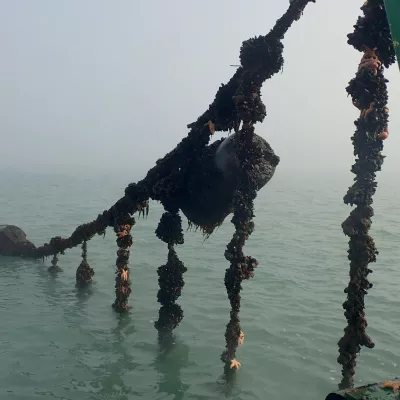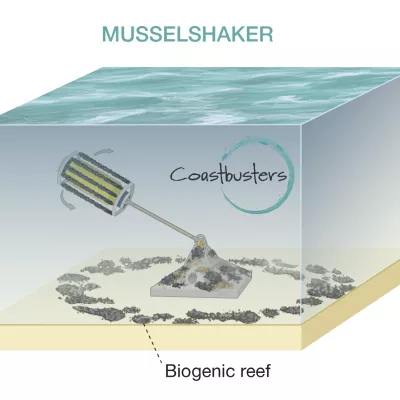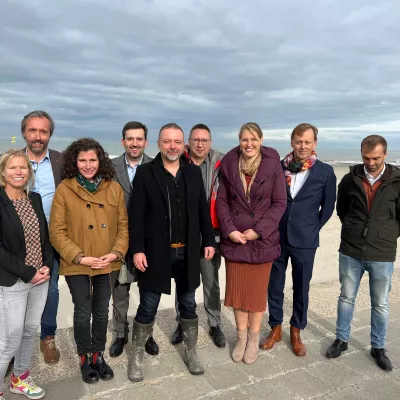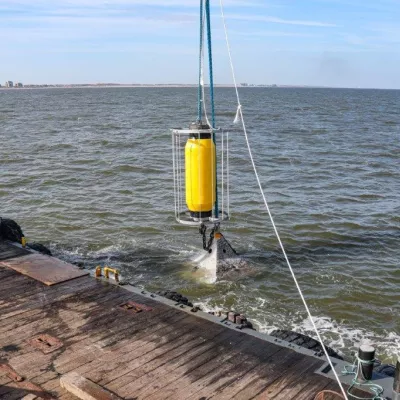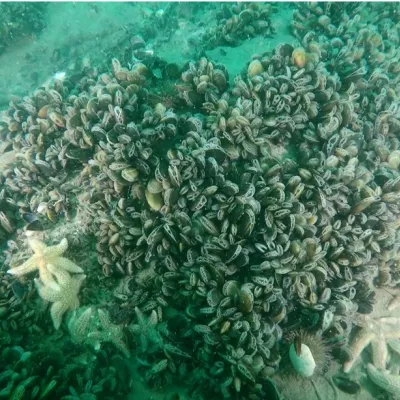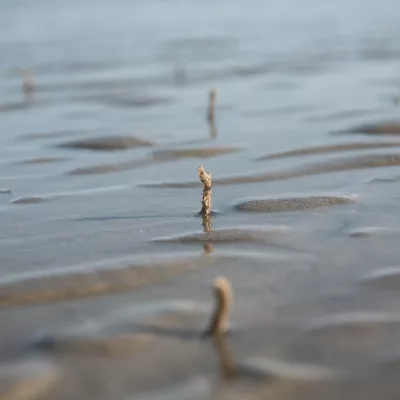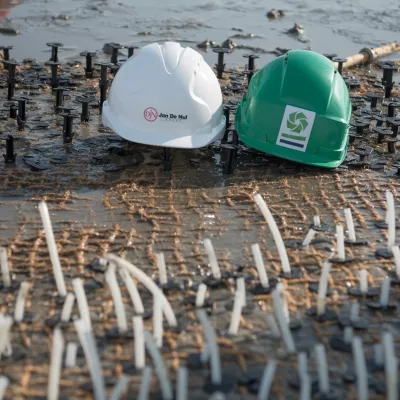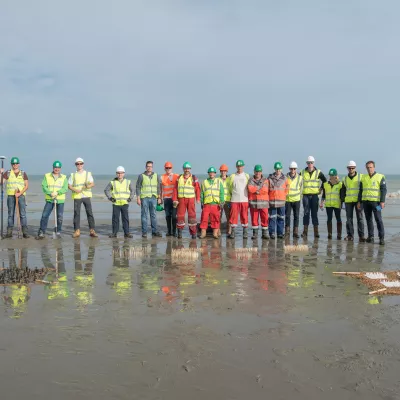Coastbusters
Towards a more natural form of coastal zone management
Coastal areas are under increasing pressure from climate change: sea levels are rising, storms are becoming more frequent and beach erosion is increasing. In addition, human activities also have an impact on the coast. As a result, we increasingly need to take measures to adequately protect our coasts.
Traditional techniques such as sea walls and dikes can become unsustainable in the long term due to, among other things, constant maintenance, the increasing risk of flooding and undesirable ecological side effects. That is why people are increasingly looking at alternatives such as nature-inspired designs (NID).
The aim is to create healthy ecosystems and to involve nature as much as possible in the protection of the coast. Such solutions also help improve water quality and increase biodiversity, and have a positive impact on soil and overall nature conservation.
The Coastbusters partners are investigating what natural measures are possible in the Belgian part of the North Sea, with the aim of further deepening that knowledge and exporting it internationally in order to achieve a more natural form of coastal protection worldwide.
The Coastbusters work with biobuilders: plant and animal species that have a positive influence on their environment and can build biogenic reefs. These biogenic reefs can avoid erosion and contribute to coastal defense
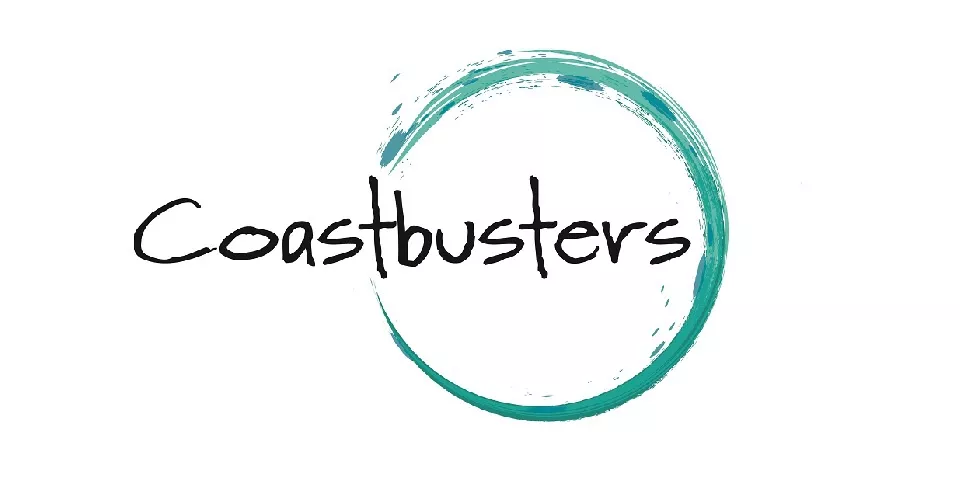
Sub-projects
Coastbusters is an umbrella concept within which various projects are conducted that conduct research into nature-inspired solutions to protect the coast. An overview of the different projects that are currently underway or have meanwhile been completed can be found below:
Biogenic reefs
This sub-project investigated the viability of three different reef concepts off the Belgian coast. Three important species groups which naturally occur in the North Sea and stabilise the sediment were examined: seagrass and seaweed; blue mussel (Mytilus edulis); and sandstone worm (Lanice conchilega).
Three common goals were identified:
- The organisms must survive the dynamic conditions of the marine environment and maintain their ecological functions;
- The biogenic reef must be stable and provide ecological added value within the local coastal ecosystem; and
- The biogenic reef must develop in such a way that local sedimentation and natural stabilisation of the intertidal area take place.
The project has enabled the industrial partners to valorize sustainable business opportunities and has provided the research institutions with a wealth of knowledge, placing the Flemish marine knowledge ecosystem at the forefront of this innovation field.
|
Duration: 2017-2020 Partners: ILVO, DEME, Jan De Nul, SIOEN Industries and eCoast. With the support of: VLAIO. Contact: Kristien Veys |
Bivalve reefs and biomaterials
This sub-project covered four research avenues:
- Research into marine biodegradable & sustainable (bio)materials as building blocks for coastal defense concepts. It was investigated which properties have a biofacilitating effect and how they can be integrated into anchoring systems. Based on this research, a blueprint was made for sustainable materials for coastal defense concepts.
- Designing a biogenic reef concept for sustainable and resilient development. The conventional setup was contrasted with the newly developed modular setup. The technical conditions for installation, maintenance & demolition, as well as the safety of materials, structures and operations, were taken into account.
- To monitor the evolution of the biogenic reef, the reef must be closely observed and studied. For this purpose, a high-quality, scientifically based monitoring roadmap was developed that can be applied under various circumstances (worldwide) for both growth and decline of the reef.
- The final research avenue concerned the preconditions and ecosystem services to valorize the added value of the concept for the ecosystem. Structural and functional indicators were identified and validated to evaluate the functional changes of the seabed ecosystem.
The results of this project were presented on 16 October 2023 during the Coastbusters Day. Want to learn more? Download the final report.
|
Duration: 2020-2023 Partners: DEME, Jan De Nul, Sioen Industries, ILVO and VLIZ With the support of: VLAIO Contact: Kristien Veys |
LANICE
This sub-project examines the extent to which the sand mason worm (Lanice conchilega) can assist in stabilising sediment and increasing biodiversity at the Belgian coast. This research is linked to our pursuit of sustainable coastal management systems, with a particular focus on nature-based solutions.
The project's main research avenues are:
- How can the larvae of the sand mason worm be attracted via a substrate to the target area where we want to develop concentrations;
- What influence do substrate characteristics have on local current velocity, particle capture and larval settlement?
- Do concentrations of sand mason worms have an effect on current and sedimentation?
The results of this sub-project will provide clarity as to the scalability of the project. The eventual goal is efficient implementation of marine species from soft sediment in nature-inspired designs of marine infrastructure projects.
|
Duration: 2024-2027 Partners: ILVO, VLIZ and KU Leuven With the support of: VLAIO Contact: Kinnie De Beule |
FINESSE
This subproject focuses on developing a robust financial framework for nature-based solutions (NbS) in coastal and marine environments. While NbS can deliver clear benefits for coastal protection, biodiversity and climate mitigation, their large-scale implementation is often limited by the lack of transparent and science-based financing models. FINESSE aims to address this challenge.
Within the Coastbusters programme, FINESSE explores how ecological benefits and ecosystem services can be translated into financial value. The project combines insights from eco-engineering, economics and finance to better assess costs, benefits, risks and impact of NbS, and to support informed investment decisions.
The main research questions addressed in this project are:
- How can the ecological benefits of NbS be captured in an integrated value model?
- How can risk, return and impact of NbS projects be assessed in a comparable way?
- Which indicators are needed to monitor ecological and societal impact over time?
- How can financing instruments support the wider deployment of NbS?
The results of this subproject will support the development of financing tools and impact frameworks that enable NbS to be implemented at scale through public and private investment.
| Duration: 2025–2029 Partners: Ghent University; Vlerick Business School; VLIZ; and ILVO With the support of: VLAIO Contact: Kristien Veys |
Mussel Shaker
This subproject focuses on the further development of the Mussel Shaker: a nature-based setup designed to stimulate the formation of mussel reefs. Such reefs can contribute to coastal stability and biodiversity enhancement within nature-based approaches to coastal management. The project explores how the Mussel Shaker can be technically and ecologically optimised for use both nearshore and offshore, with the aim of achieving durable and robust reef formation.
The main research questions addressed in this project are:
- How can mussel larvae be effectively attracted and supported in settling on the seabed?
- How do material choices and design influence stability and survival?
- What are the effects on currents, sediment dynamics and seabed structure?
- To what extent do the resulting reefs contribute to biodiversity and coastal protection?
The results of this subproject will provide insight into the practical applicability and scalability of the Mussel Shaker as a nature-based solution for future coastal management.
Duration: 2025–2029
Partners: DEME; Jan De Nul; Basaltex; and Mantis
With the support of: VLAIO
Contact: Kristien Veys
